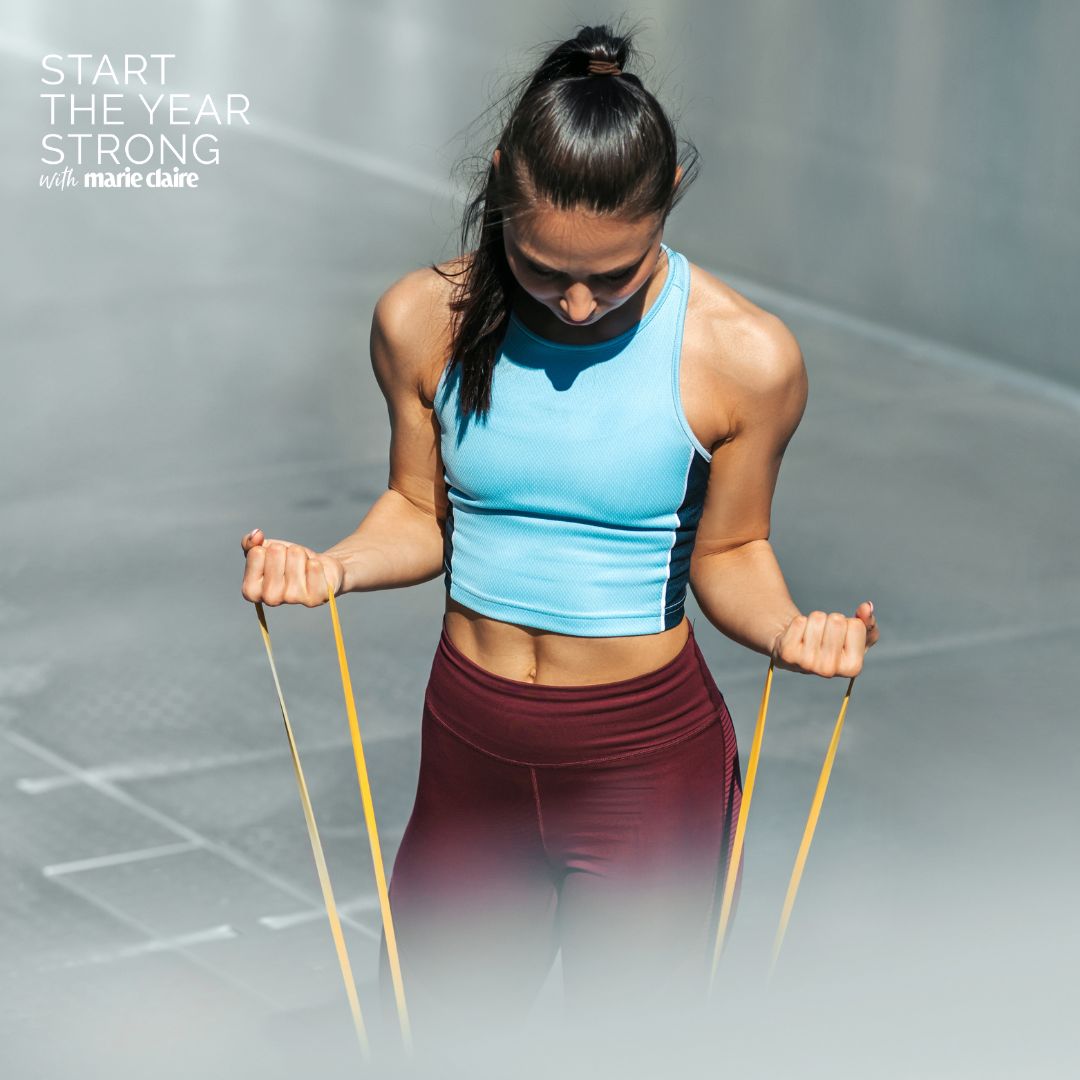
If you like your training routine to have a little more flexibility at this time of year to accommodate fluctuating weather and motivation levels, then allow us to introduce you to the best resistance band exercises for beginners.
Otherwise known as Pilates bands, they can’t, sadly, facilitate a more comfortable climate, but they can make resistance training more accessible, which is particularly helpful in winter when gym equipment is more occupied than usual and the very thought of deicing the car is enough to convince you to cancel your workout. Another benefit of using resistance bands in your sweat sessions? Resistance band exercises can be done anywhere and don’t require a significant financial investment, either (another win post-Christmas).
That resistance bands are both portable and affordable has resulted in an uptick in their popularity of late and cements them as a great beginner-friendly workout option. At the time of writing, #resistancebands features on 87.7k posts on TikTok, with creators using bands to recreate some of their favourite gym-based exercises, and sharing workouts you can do from literally anywhere. Practicality aside, resistance band exercises can also be extremely effective.
A study published in May of last year, which explored the impact of resistance band training on the physical and mental health of elderly individuals, found that it can improve both upper and lower limb flexibility, endurance, upper body strength, physical balance, and cardiopulmonary function. Additionally, there’s evidence to suggest it can boost mental wellbeing, too.
Some fitness professionals, including physiotherapist Laura Wilson, founder of The Swiss Touch, in The Body Lab, consider resistance bands a must-have tool. “Their adaptability allows me to tailor exercises to suit each person’s specific needs,” she says. “Whether someone is recovering from an injury, building strength, or looking to improve mobility, bands can be adjusted to meet their goals.”
Keen to learn more? Read on for all the benefits of using this equipment, plus, Wilson shares the best resistance band exercises to try in your next workout. Educate yourself with our explainers on resistance training vs weight training, the best resistance band leg workouts and the best resistance band exercises. If you've never used the bit of fit kit before, these expert-led round-ups of resistance band leg workouts for beginners and the most effective resistance band workouts of all time will come in handy.
These are the best resistance band exercises for beginners to try, experts confirm
What is a resistance band?
“Resistance bands are elastic strips or tubes made from fabric or latex, and they come in different thicknesses to provide varying levels of resistance,” Wilson explains. They tend to be colour-coded, which helps you easily identify the most suitable band for your exercise or workout.
“Unlike traditional weights, which rely on gravity, resistance bands offer variable resistance meaning that the tension increases as the band stretches. This mirrors how muscles naturally work, making them incredibly versatile for strength training, injury rehab, and improving mobility," she continues.
@bossingmotherhood ♬ Caalm Dooown - EL Locco
What are the benefits of using a resistance band?
There are several key benefits of using resistance bands – some which we’ve already touched upon – that make them such an important piece of equipment in both fitness and rehab settings, according to Wilson.
1. They'll help to improve your strength
“Bands challenge muscles through their full range of motion, which promotes muscle growth and strength,” says Wilson. “There’s good research showing that resistance band training can produce similar strength gains to traditional weights, especially for people new to training or during early rehab.”
Research from 2019 indicated that exercising with elastic devices, such as resistance bands, provides similar improvements in strength when compared to resistance training performed with weight machines and dumbbells. “The variable resistance also activates our stabilising muscles, in turn improving our functional strength,” Wilson adds.
2. They're great for injury prevention and rehabilitation
Wilson rates resistance bands for rehabilitation due to being low impact and allowing for a controlled, gradual progression. “They reduce the stress on joints while strengthening supporting muscles,” she says. “I use them a lot with clients with lower limb pain and recovering post operatively. Strengthening the muscles around a joint improves stability, reduces the risk of re-injury, and enhances movement quality.”
3. They're accessible and cost-effective
Typically, you can purchase a set of resistance bands for around the £20-£30 mark, making them a cost-effective alternative to gym equipment, depending on your overarching goals.
“They’re lightweight and easy to pack, so you can do your exercises at home or even when travelling,” Wilson says. “This accessibility helps people stick to their exercise routines, which is critical for long-term success.”
4. They'll improve your flexibility and mobility
Bands aren’t just for strength. According to Wilson, they’re also great for stretching and can help improve your range of motion and joint mobility. “I often use dynamic stretches with bands as part of a warm-up, and static stretches to increase flexibility over time,” she says.
5. They'll boost your functional fitness
And finally, resistance bands promise to improve your range of motion and ease of movement day-to-day. “Many band exercises mimic real-life movements,” says Wilson. Think: pushing and pulling heavy items, climbing stairs, sitting and standing, and so on. “This means they improve how you move in daily activities, like lifting, bending, or reaching,” the expert elaborates. “Functional fitness is essential for preventing injuries and staying active as we age.”
Do resistance band workouts really work?
Whether or not resistance band workouts are effective really depends on how you define the word. If your goal is to build significant muscle mass, for example, then solely doing resistance band exercises is unlikely to help you achieve your objective – at least not efficiently.
But if it’s improved strength, reduced risk of injury and the flexibility to train anywhere you’re after, resistance band workouts absolutely do the trick. "There are many exercises you can do with resistance bands, from core work to mobility drills. The key is to choose the right resistance and focus on good form," says Wilson.
If you are unsure, she urges you to consult a physiotherapist or qualified trainer to get personalised advice.
5 best resistance band exercises for beginners
1. Lateral band walks
What? A simple side walk that involves looping the resistance band around your legs to add tension and fully engage your lower body muscles.
Why? "Glute strength is essential for hip stability and helps prevent knee and lower back pain," Wilson says. "I find this exercise particularly helpful for runners or anyone recovering from lower limb injuries."
How long? Aim for fifteen to twenty reps, for three to four rounds.
2. Band pull-aparts
What? Again, a fairly simple move that involves a subtle yet seriously spicy pulling outwards of the band, using both hands and engaging your bicep, tricep and upper back muscles.
Why? "This exercise strengthens the upper back muscles and helps to improve posture, which is especially important for people who sit for long periods," Wilson says.
How long? Aim for fifteen to twenty reps, for three to four rounds.
3. Banded squats
What? You'll likely all have tried a bodyweight squat before, but have you ever added a resistance band to the mix? This is a great move for beginners as you'll (most likely) already be comfortable with the move, yet adding a touch of tension thanks to the band.
Why? Utilising a band adds resistance to, and increases the intensity of, squats. "This further engages the glutes and quads," says Wilson. "It’s a great way to build lower body strength and improve movement patterns."
How long? Aim for fifteen to twenty reps, for three to four rounds.
4. Banded rows
What? Another simple yet effective move, this mimics the dumbbell or kettlebell row you may do in the gym but uses a trusty old band instead.
Why? "This exercise strengthens the back and biceps, which improves pulling strength and posture, two areas I see people neglect in their workouts," Wilson says.
How long? Aim for fifteen to twenty reps, for three to four rounds.
5. Standing banded shoulder press
What? Last but by no means least, this is a more advanced move that may take some practice to get right but, long term, will improve both your shoulder mobility and arm strength.
Why? "Shoulder stability is crucial for overhead movements, whether that’s putting something on a high shelf or performing a sports movement," Wilson says. This exercise builds strength and helps prevent shoulder injuries.
How long? Aim for fifteen to twenty reps, for three to four rounds.
Shop MC UK's go-to workout kit now:
These mini loop bands are ideal for adding resistance to squats and hip thrusts, and for activating glutes pre-workout.
Soft, supportive and sweat-wicking, we can see why all of the Kardashian sisters are obsessed with Alo Yoga kit - and these 7/8 leggings are no exception. They're butter soft, fit like a glove, and compress and support like a dream.







